Greek Catholic community in New Zealand: most parishioners are immigrants from eastern Ukraine
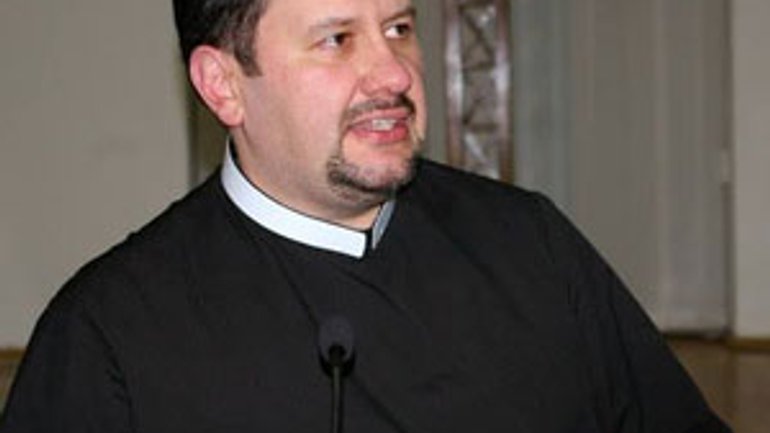
Interviewer: Taras Antoshevskyy
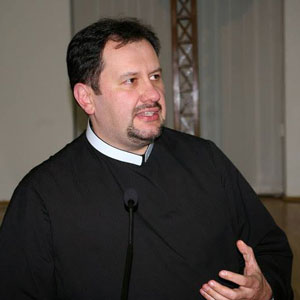
What do we know about New Zealand? It is the constitutional monarchy with parliamentary democracy, a part of the British Commonwealth. A country of volcanoes, with unique nature, which is among the most advanced countries in the world. Here a small Ukrainian community lives. Recently the first fully Ukrainian parish has been founded here. Its first rector is Fr. Igor Kolisnyk, who until recently was the Provincial Superior of the Redemptorist Congregation in Ukraine. He has lately visited his homeland and we took the opportunity to talk with him.
How it all began ...
After the Second World War a large number of Ukrainian citizens who had justified fears of the Soviet Union and its regime, were leaving not only for the United States or Canada, but also for New Zealand. Then the Ukrainian community consisted of about three thousand people. This is a very large community for such a small country. The situation of spiritual leadership in New Zealand has developed as follows: since the Ukrainian community in Australia was even greater, all pastoral forces were concentrated there. Bishop John Prasko together with those priests who were in Australia, the great community tried to organize something, offer spiritual care, as the faithful were scattered throughout the continent. Meanwhile, a community in New Zealand remained a bit aside, for purely objective reasons, though our priests came here to serve from time to time. In New Zealand, I heard about one of the local Latin rite priests who was familiar with the Byzantine rite and served for Ukrainians in Christ church.
In the 60-ies, after World War II, the Ukrainian community was a little bit “dispersed.” The younger generation got assimilated. Ukrainians generally assimilate quickly, and in New Zealand it was extremely fast. The second and third generation almost completely lost sight of the Ukrainian community, nothing to say about the Church. In the 90's, a new wave of Ukrainian immigration came. These were not political emigrants, they were people who came there for economic reasons. First of all, there were people from Central and Eastern Ukraine. They also had a little bit different attitude to church life than Western Ukrainians did. Our priests continued to come from Australia to spiritually support their fellow countrymen - 2-3 times a year. Even with such frequency, Ukrainians could be urged to come to church. Usually there were 30-40 people at liturgies in Auckland, in Wellington there were 20-30 people and not only Ukrainian.
Bishop Peter Stasiuk and me were initially quite optimistic when talking about establishing a permanent ministry in New Zealand. I cannot say that we were disappointed by the fewer number of people who regularly gather to worship, we just realized that everyday reality is a little different. It consists in the fact that Ukrainians promptly became a part of New Zealand society, which is extremely irreligious - 54% of the population of this country are atheists, only 11% are Catholics. By the way, now the Catholics have become the largest religious community in New Zealand, previously it was the Anglican Church. But there is a steady decline of overall religiosity. The Catholic community is growing owing to immigrants from the Philippines, Indonesia and other neighboring countries, but the general attitude of society towards the Church is rather indifferent. And thank God, not hostile.
In New Zealand there are no rich and intense internal conflicts in the Catholic Church as well as the tension between church, state and society, as in neighboring Australia. Maybe this is due to a different legal system that encourages endless litigation in most situations.
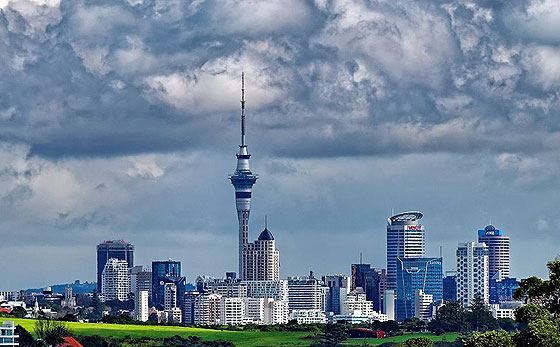
Ukrainians have in turn become part of the society in which sport is often a priority. For New Zealanders sport is above all else, a kind of state religion, you might say. In addition, it has rather difficult working conditions, people must work hard to maintain at least the average standard of living. Actually, their life is concentrated on the need to earning and keeping the family instead focus on the need for constant spiritual life of the church community here.
When I arrived and we gathered in Auckland, at the meeting and Mass on Sunday, 30 people came. Five people came to our next liturgy. But finally we created our small community, which is actually divided into three parts, as the Liturgy is held in three cities: 2 times a month in Auckland, 1 time a month - in Wellington, 1 time a month - on the southern island in Christ church.
So there was a Ukrainian parish, which is alive although not numerous and concerned about their spiritual life. Obviously, there are many “sympathizers.” On major holidays, Easter for example, we gather from 40 or 50 people.
Our expectations at the beginning were quite optimistic, because when I represented the Bishop, we have hope that in three years we will have three Ukrainian parishes with their schools. Now I understand that it's not real. In Australia, we used to look at as the Ukrainian community rather homogeneous community mostly composed of former Galicians, with their church and faith tradition. Instead, in New Zealand there are mostly eastern Ukrainian, with their special attitude to religion. We realize that most of those who go to our Catholic communities are Orthodox by origin ...
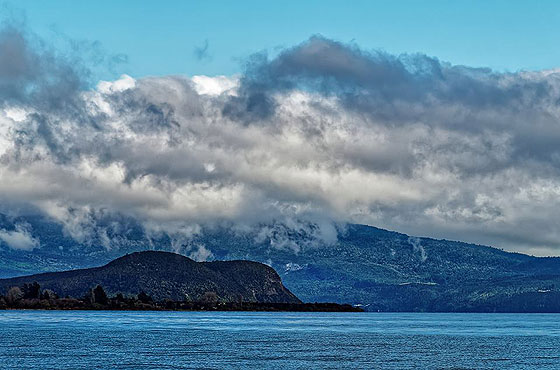
- How do they perceive you? Are there any Orthodox priests for them?
- In New Zealand there are only parishes of the Moscow Patriarchate. And when the Revolution of Dignity in Ukraine burst out, local representatives of the MP on the side of Russia because Ukrainians (regardless of whether they are Russians or Ukrainians) have decided that they cannot be in the community, serving against their homeland. If they even went to the MP, now a part of them deliberately moved to the Serbian, Romanian or Greek Orthodox Churches.
Some come to us. But there is sometimes a problem with the understanding of church affiliation. We are good Christians, who considered themselves as belonging to the Kyiv Patriarchate, but come to us due to lack of permanent pastoral care. Of course, they could invite someone from the Ukrainian Orthodox Church in Australia, but those people cannot afford it financially. And ROC communities are run by Russia.
Some of our Ukrainian Orthodox brothers and sisters share a belief – if you come to the Greek Catholics, you betray traditions and faith. We try to explain that we are a community of Catholic Christians of the Byzantine rite. Explain that they can come to confession and Communion, to participate fully in the liturgy, being Orthodox. Some are conscious of this, but many people lack understanding. For them, the word “Catholic” is the barrier that they cannot overstep.
- And how then you call yourself there?
- We sincerely and openly say that we are the Ukrainian Greek Catholic Church. Many perceive it and have no problems with the fact, as we said from the beginning that we are a community that is open to all. As long as understanding of the Ukrainian sacraments is the same, we reject no one, we only welcome. And not only Christians, but also Protestants and Latins come to us who are interested in the Eastern rite. A man from Argentina comes to each liturgy.
- What is he interested in?
- Many things. First of all, I think it is the rite. Also, oddly enough, many people like that we are not numerous. I.e. our worship is homelier, more chamber-like, there is communication before and after, not burdened by formalities. One of the advantages of small communities is a gentility that can have even their specific traditions. For example, after the liturgy we share a meal, a chance to talk. It is something bigger and deeper than just formal membership in a particular church community - it is a family life, not a structural life of faith.
Again I say, in practice it all looks different than we thought. For here we have another social structure of the church community. First, no one is asking: who, where, why. We just say that we then and there-and everyone can come. Now everyone communicates through Facebook and receives e-mail – there is enough information. We do not hide from anyone.
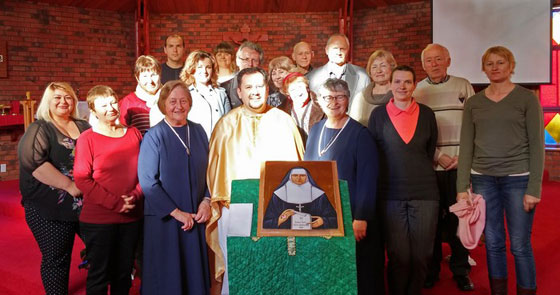
- What is the percentage of the Greek Catholics in this community?
- In Auckland there are 4 families, and the whole city just 500-600 people of Ukrainian origin. If we calculate, a fifth of out of 50 people who came for Easter might have been the Greek Catholics.
It should be noted that the structure of our communities is different, because in the south of New Zealand we have more Greek Catholics - 12 people. Sermons are bilingual (Ukrainian and English), in addition to Auckland where we can be exclusively Ukrainian, although not always. We must remember also that Ukrainian community in New Zealand is mostly Russian-speaking.
We do not have our own churches – we are going into Roman Catholic churches. In Oakland going to the temple of Redemptorists in Wellington - the main cathedral side chapel in Christchurch - the church of Roman Catholics. Cardinal-Archbishop of Wellington is open to us, we find a great understanding with him.
My life in New Zealand is not restricted to ministry in the Ukrainian community. I live in a large community of Redemptorists - 15 people, 3 monasteries in one city. I help them in the pastoral care among Roman Catholics.
- Is there a vocation to religious life?
- There is vocation, but not that much. Now in New Zealand, there are many priests from the Philippines, Indonesia and Vietnam. In New Zealand, the social structure of faithful Catholics is quite specific - a large number of faithful are non-native (Indians, Indonesians, Vietnamese, people from the Polynesian Islands). Syro-Malabar Catholic Church is very strong in New Zealand – there is only a thousand parishioners in Oakland. In fact, the Redemptorists are also involved in the pastoral care in Syro-Malabar Catholic Church.
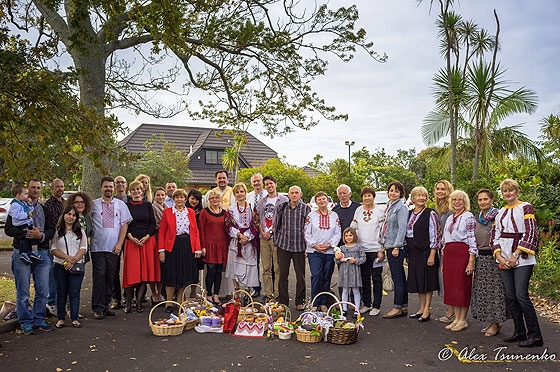
- Social issues: what do the Ukrainian do there? Where they live - in rural or urban areas, what is their education, intellectual level?
- The majority of Ukrainians have higher education, and sometimes - two, three educations. It depends on location. Those living in Oakland, to a large extent are IT professionals - they came here in the 90’s because there was a request for it. Now it is more difficult to find work, because the number of IT professionals in New Zealand is higher than the percentage of musicians and doctors in Israel (he smiles).
Some Ukrainians are living on farms in the south, or dealing with bees, to the north. Many Ukrainian builders are working for because of the earthquake in Christchurch city still needs reconstruction. That is different, and probably a substantial part of those people are not from another higher education.
Church and National...
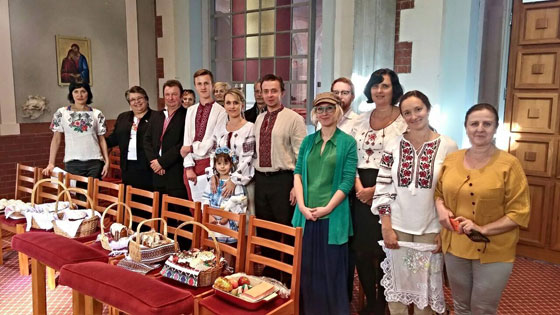
- In general, they feel there is Ukrainian? What affects their national outlook?
- Probably that general problem was that at the “end of the earth” there is a need of spiritual friends. For a long time, also in New Zealand, there was a certain idea of “homo soveticus.” The idea was that we - the former “Soviet” people are one people. It was also promoted by Russian state, the Church, we are one people and we have nothing to share. Maidan in Ukraine was important because of a change in consciousness, it crystalized certain things, it became a key distinguishing element: for Russians it was a “coup” and for Ukrainians – a speech in defense of the dignity of its people, the right to justice. Prior to the revolutionary events “post-Soviet” people come just to talk, but all those people at the end of 2013 dropped out.
Now, the Ukrainian community has become more nationally conscious. It is possible to say that it started in 2013, but this is not true. It started much earlier, because there can be a Ukrainian a month or two. Independence and war helped this process crystallized. Now all our Ukrainian embroidered shirts here are that almost got blood and sweat, proud to walk in them. Yes, many of them speak Russian, but the Ukrainian flag is everything for them. They became active. Now I know 2-3 communities that collect funds for the Ukrainian army, for immigrants, orphans in Eastern Ukraine.
- Who has such impact on them, what kind of information? Clearly, there was a Russian propaganda, but from which they drew about events in Ukraine?
- Via the Internet and contact with loved ones. Access to information cannot be limited. On the other hand, New Zealand slightly different approaches to the events in Ukraine, but in general I can say that New Zealand press is pretty pro-Ukrainian. And the actions we took in support of Ukrainian received approval from the New Zealand society and media space. It is purely in terms of truth and justice New Zealand is on the side of Ukraine.
Obviously, Russian propaganda has something to do with it, some people live in conspiracy theories of destroying America, though not everyone understands these “conspiracy theories” and can explain them. New Zealand, because of its history, has a slightly anti-American sentiment. It is not even a very strong, but it is. So if there are any conflicts between the US and someone that people think, “and that can support the other side.” But in the case of conflict between Ukraine and Russia, the New Zealanders definitely support us. More established this position through the events in Syria. Frankly, New Zealanders are concerned more about Syria than over Ukraine. That year they accepted 750 refugees from Syria and are constantly helping refugees.
I must say that while New Zealanders are living on the edge of the world, but they worry about events around the world. Moreover, it is not just interest but also attempts to actively participate in the process.
About things that unite
- What is the highlight of your community? Although it is clear that it is among the most ecumenical.
- We love to eat (smiles). Ukrainians in New Zealand generally like good Ukrainian cuisine. So we like to be together at a common meal after the Liturgy.
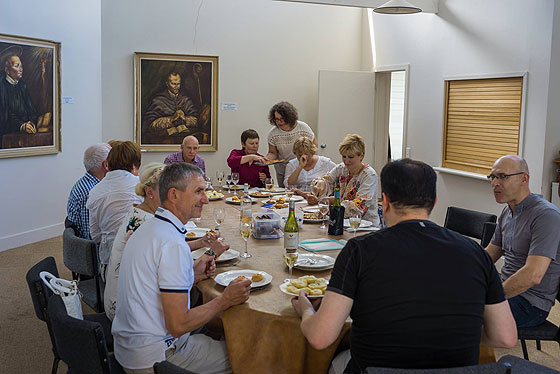
- Is there something that brought Ukrainian cuisine in New Zealand, the things which did not exist there?
- We try to teach others eat dumplings, soup, fat ... big twist is the pride and the desire to promote Ukrainian culture among the local population. We do workshops on making Ukrainian outfits dolls. There are so many creative Ukrainians who want to try and do something. Perhaps not always possible, because not much time - to gather, many people need to go far away. In fact, so many people - so many highlights. The issue of volunteering at international fairs has never been problematic.
Moreover, both the New Zealanders as the Ukrainians honor gentility. Therefore, it is not hard for Ukrainians to find common ground and promote their culture.
So, everything is great here!









